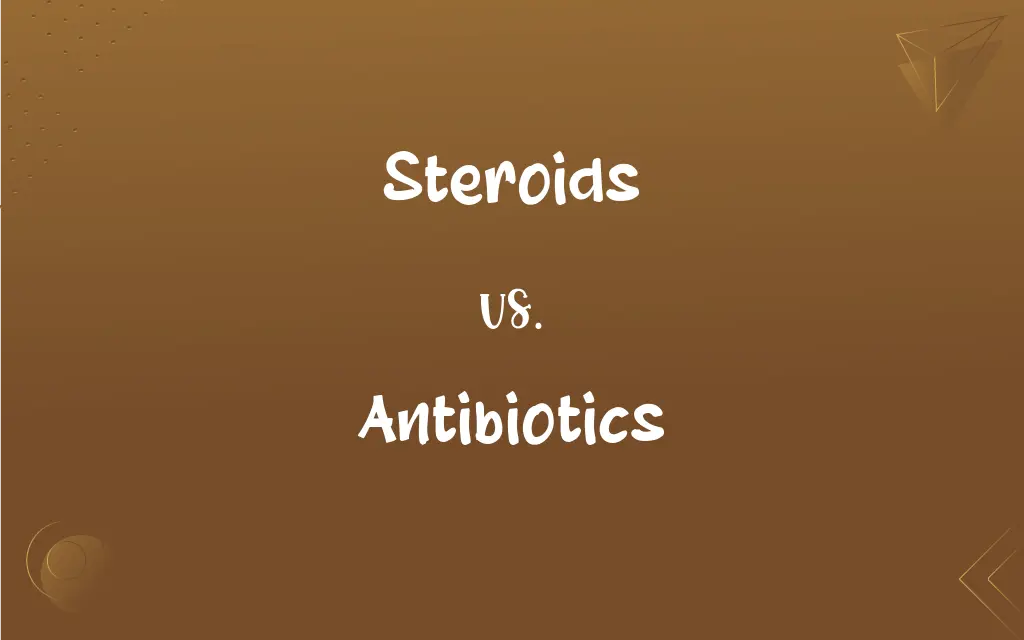Steroids vs. Antibiotics: What's the Difference?
Edited by Janet White || By Harlon Moss || Updated on October 18, 2023
Steroids are anti-inflammatory drugs reducing swelling and pain, while antibiotics combat bacterial infections.

Key Differences
Steroids are a class of drugs known to reduce inflammation, suppress the immune system, and aid in muscle building. Antibiotics, on the other hand, are specifically designed to fight bacterial infections by either killing the bacteria or inhibiting their growth.
Steroids can be naturally occurring or synthetic, and they play crucial roles in various body functions, including metabolism, inflammation control, and muscle development. Antibiotics, in contrast, don't play a natural role in the body but are introduced to treat infections caused by harmful bacteria.
The use of steroids spans a broad range of applications, from treating conditions like asthma, arthritis, and certain skin ailments to enhancing physical performance in sports. Antibiotics are solely used in the realm of medicine, prescribed to patients when bacterial infections are present, ensuring the body can effectively fight off the invading organisms.
Misuse of steroids, especially anabolic steroids, can lead to a variety of health problems, including hormonal imbalances, liver damage, and cardiovascular issues. Antibiotics, when misused or overused, can lead to antibiotic resistance, making certain bacteria immune to the drugs designed to kill them.
Both steroids and antibiotics require careful administration. Over-reliance or inappropriate use can result in side effects and other complications. It's essential to understand that while steroids address inflammation and related symptoms, antibiotics target the causative agents of bacterial infections.
ADVERTISEMENT
Comparison Chart
Primary Purpose
Reduce inflammation, suppress immune system
Fight bacterial infections
Nature
Naturally occurring or synthetic
Generally synthetic, derived from natural sources
Usage
Medical and sports enhancement
Medical (treatment of bacterial infections)
Consequences of Misuse
Hormonal imbalances, liver damage
Antibiotic resistance
Interaction with Body's Defense
Can suppress the immune system
Assist the immune system in fighting bacteria
ADVERTISEMENT
Steroids and Antibiotics Definitions
Steroids
Drugs suppressing the immune response.
To prevent organ rejection, he was given steroids after the transplant.
Antibiotics
Drugs combating bacterial infections.
She took antibiotics to treat her strep throat.
Steroids
Compounds reducing inflammation and pain.
After the injury, she was prescribed steroids to reduce swelling.
Antibiotics
Medicines inhibiting bacterial growth.
Overusing antibiotics can lead to resistance.
Steroids
Hormones synthesized in the body or artificially.
Doctors often use steroids to treat autoimmune diseases.
Antibiotics
Compounds killing or limiting bacteria.
Doctors caution against using antibiotics for viral infections.
Steroids
Chemicals affecting metabolism and immune function.
Certain steroids help control metabolism and inflammation.
Antibiotics
Agents used against bacterial pathogens.
Without antibiotics, many bacterial diseases would be lethal.
Steroids
Substances aiding in muscle growth.
Many athletes are tested for illegal steroids use.
Antibiotics
Substances used for bacterial treatment.
It's essential to complete the full course of antibiotics to prevent resistance.
Steroids
Any of numerous fat-soluble organic compounds that have a core structure of 17 carbon atoms arranged in four rings, found naturally in animals, plants, and fungi, or produced synthetically. Steroids include the sterols (such as cholesterol), sex hormones (such as estrogen and testosterone), corticosteroid hormones (such as cortisol), bile acids, and anabolic steroids.
Antibiotics
A substance, such as penicillin or erythromycin, produced by or derived from certain microorganisms, including fungi and bacteria, that can destroy or inhibit the growth of other microorganisms, especially bacteria. Antibiotics are widely used in the prevention and treatment of infectious diseases.
Steroids
(Informal) An anabolic steroid.
Antibiotics
Of or relating to antibiotics.
Steroids
Plural of steroid
Antibiotics
Of or relating to antibiosis.
Antibiotics
Destroying life or preventing the inception or continuance of life.
Antibiotics
Plural of antibiotic
FAQs
Can steroids help with infections?
Steroids can reduce inflammation from infections but do not directly treat the causative agents like antibiotics do.
What are steroids used for?
Steroids are used to reduce inflammation, suppress the immune system, and aid in muscle growth.
Are antibiotics effective against viruses?
No, antibiotics target bacteria, not viruses.
Why is it bad to overuse antibiotics?
Overuse can lead to antibiotic resistance, where bacteria become immune to the drugs.
Are there risks with long-term steroid use?
Yes, prolonged steroid use can lead to hormonal imbalances, bone density loss, and other health issues.
Can I stop taking antibiotics once I feel better?
No, it's crucial to complete the full course to ensure all bacteria are eradicated.
Are steroids hormones?
Some steroids, like cortisol and testosterone, are hormones, but not all steroids function as hormones.
Can bacteria become immune to antibiotics?
Yes, misuse of antibiotics can lead to resistant strains of bacteria.
Are there natural steroids?
Yes, the body naturally produces steroids like cortisol and aldosterone.
Can antibiotics treat fungal infections?
No, antibiotics target bacteria; antifungal medications treat fungal infections.
Are all steroids the same?
No, there are different types of steroids with varying purposes, like corticosteroids and anabolic steroids.
Why shouldn't antibiotics be used for the common cold?
The common cold is caused by viruses, and antibiotics target bacteria.
Do steroids have side effects?
Yes, steroids can have side effects like weight gain, mood changes, and increased blood pressure.
What happens if I misuse antibiotics?
Misuse can lead to antibiotic resistance, reduced efficacy in treating future infections, and potential side effects.
What are antibiotics primarily used for?
Antibiotics are used to treat bacterial infections.
How do antibiotics work?
Antibiotics either kill bacteria or inhibit their growth, aiding the body's defense system.
Do steroids always suppress the immune system?
While many steroids suppress the immune response, the effect varies based on the type and dosage.
Can athletes legally use steroids?
Most sports organizations ban the use of performance-enhancing steroids.
Can steroids help with allergies?
Yes, steroids can reduce allergic reactions by suppressing the immune response.
Are there natural antibiotics?
Some substances, like garlic and honey, have natural antibiotic properties, but they're not as potent as synthetic antibiotics.
About Author
Written by
Harlon MossHarlon is a seasoned quality moderator and accomplished content writer for Difference Wiki. An alumnus of the prestigious University of California, he earned his degree in Computer Science. Leveraging his academic background, Harlon brings a meticulous and informed perspective to his work, ensuring content accuracy and excellence.
Edited by
Janet WhiteJanet White has been an esteemed writer and blogger for Difference Wiki. Holding a Master's degree in Science and Medical Journalism from the prestigious Boston University, she has consistently demonstrated her expertise and passion for her field. When she's not immersed in her work, Janet relishes her time exercising, delving into a good book, and cherishing moments with friends and family.
































































